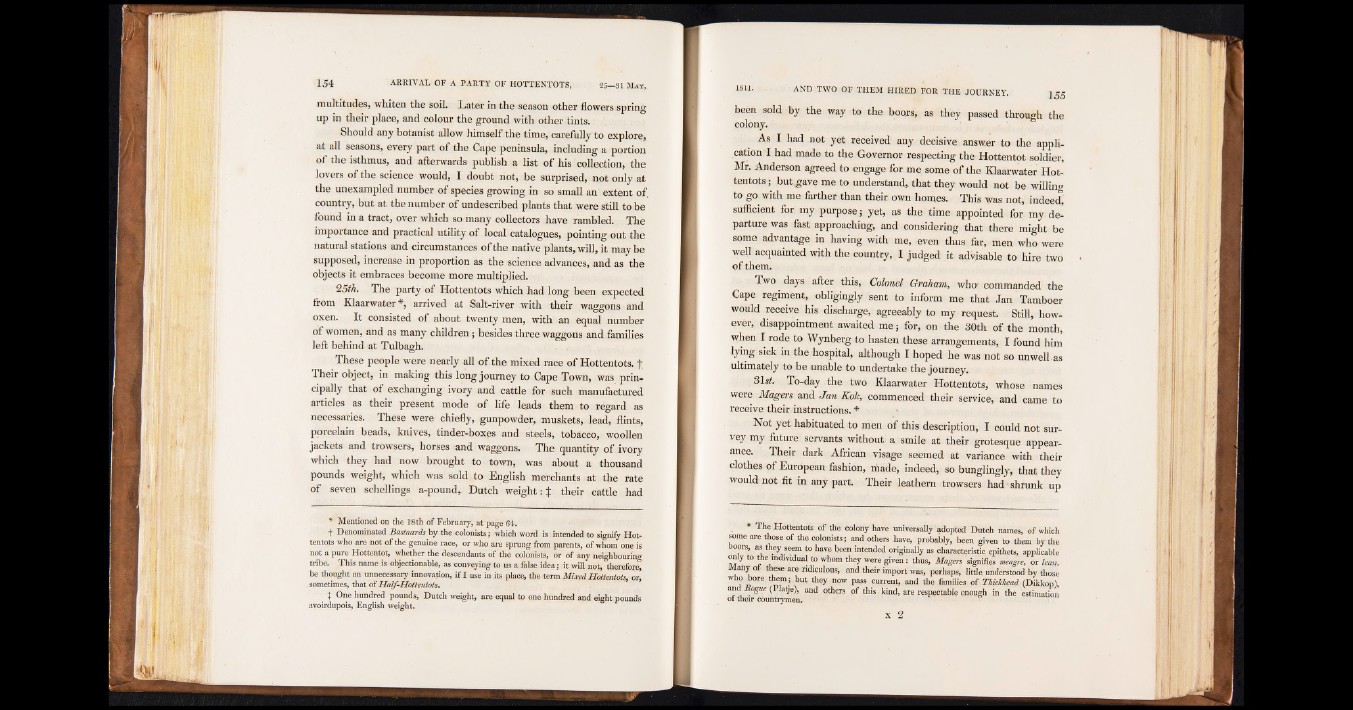
multitudes) whiten the soil. Later in the season other flowers spring
up in their place, and colour the ground with other tints.
Should any botanist allow himself the time, carefully to explore,
at all seasons, every part of the Cape peninsula, including a portion
of the isthmus, and afterwards publish a list of his collection, the
lovers of the science would, I doubt not, be surprised, not only at
the unexampled number of species growing in so small an extent oft
country, but at the number of undescribed plants that were still to be
found in a tract, over which so many collectors have rambled. The
importance and practical utility of local catalogues, pointing out the
natural stations and circumstances of the native plants, will, it maybe
supposed, increase in proportion as the science advances, and as the
objects it embraces become more multiplied.
25th. The party of Hottentots which had long been expected
from Klaarwater *, arrived at Salt-river with their waggons and
oxen. It consisted of about twenty men, with an equal number
of women, and as many children; besides three waggons and families
left behind at Tulbagh.
These people were nearly all ofthe mixed race of Hottentots, ft
Their object, in making this long journey to Cape Town, was principally
that of exchanging ivory and cattle for such manufactured
articles as their present mode of life leads them to regard as
necessaries. These were chiefly, gunpowder, muskets, lead, flints,
porcelain beads, knives, tinder-boxes and steels, tobacco, woollen
jackets and trowsers, horses and waggons. The quantity of ivory
which they had now brought to town, was about a thousand
pounds weight, which was sold to English merchants at the rate
of seven schellings a-pound, Dutch weight:^ their cattle had
* Mentioned on the 18th of February, at page 64.
f Denominated Bastaards by the colonists; which word is intended to signify Hottentots
who are not of the genuine race, or who are sprung from parents, of whom one is
not a pure Hottentot, whether the descendants of the colonists, or of any neighbouring
tribe. This name is objectionable, as conveying to us a false idea; it will not, therefore,
be thought an unnecessary innovation, if I use in its place, the term Mixed Hottentots, or,
sometimes, that of Half-Hottentots.
t One hundred pounds, Dutch weight, are equal to one hundred and eight pounds
avoirdupois, English weight.
been sold by the way to the boqrs, as they passed through the
colony.
As I had not yet received any decisive answer to the application
I had made to the Governor respecting the Hottentot soldier,
Mr. Anderson agreed to engage for me some ofthe Klaarwater Hottentots;
but.gave me to understand, that they would not be willing
to go with me farther than their own homes. This was not, indeed,
sufficient for my purpose; yet, as the time appointed for my departure
was fast approaching, and considering that there might be
some advantage in having with me, even thus far, men who were
well acquainted with the country, I judged it advisable to hire two
of them.
Two days after this, Colonel Graham, who* commanded the
Cape regiment, obligingly sent to inform me that Jan Tamboer
would receive his discharge, agreeably to my request. Still, however,
disappointment awaited me; for, on the 30th of the month,
when I rode to Wynberg to hasten these arrangements, I found him
lying sick in the hospital, although I hoped he was not so unwell.as
ultimately to be unable to undertake the journey.
31 st. To-day the two Klaarwater Hottentots, whose names
were Magers and Jan Kok, commenced their service, and came to
receive their instructions. *
Not yet habituated to men of this description, I could not survey
my future servants without a smile at their grotesque appearance.
Their dark African visage seemed at variance with their
clothes of European fashion, made, indeed, so bunglingly, that they
would not fit in any part. Their leathern trowsers had ■ shrunk up
* The Hottentots of the colony have universally adopted Dutch names, of which
some are those of the colonists; and others have, probably, been given to them by the
boors, as they seem to have been intended originally as characteristic epithets, applicable
only to the individual to whom they were given : thus, Magers signifies meagre, or lean.
Many of these are ridiculous, and their import was, perhaps, little understood by those
who bore them ; but they now pass current, and the families of Thickhead (Dikkopl
an gue (Platje), and others of this kind, are respectable enough in the estimation
or their countrymen.